Lifecycle Development: Analysis of Karl's Development and Needs
VerifiedAdded on 2023/01/23
|13
|4098
|22
AI Summary
This report analyzes the case of Karl who has been at Foster home for more than ten years. The report discusses the stages of Karl`s development in his lifecycle, factors that influence Karls development, and his needs at each stage.
Contribute Materials
Your contribution can guide someone’s learning journey. Share your
documents today.
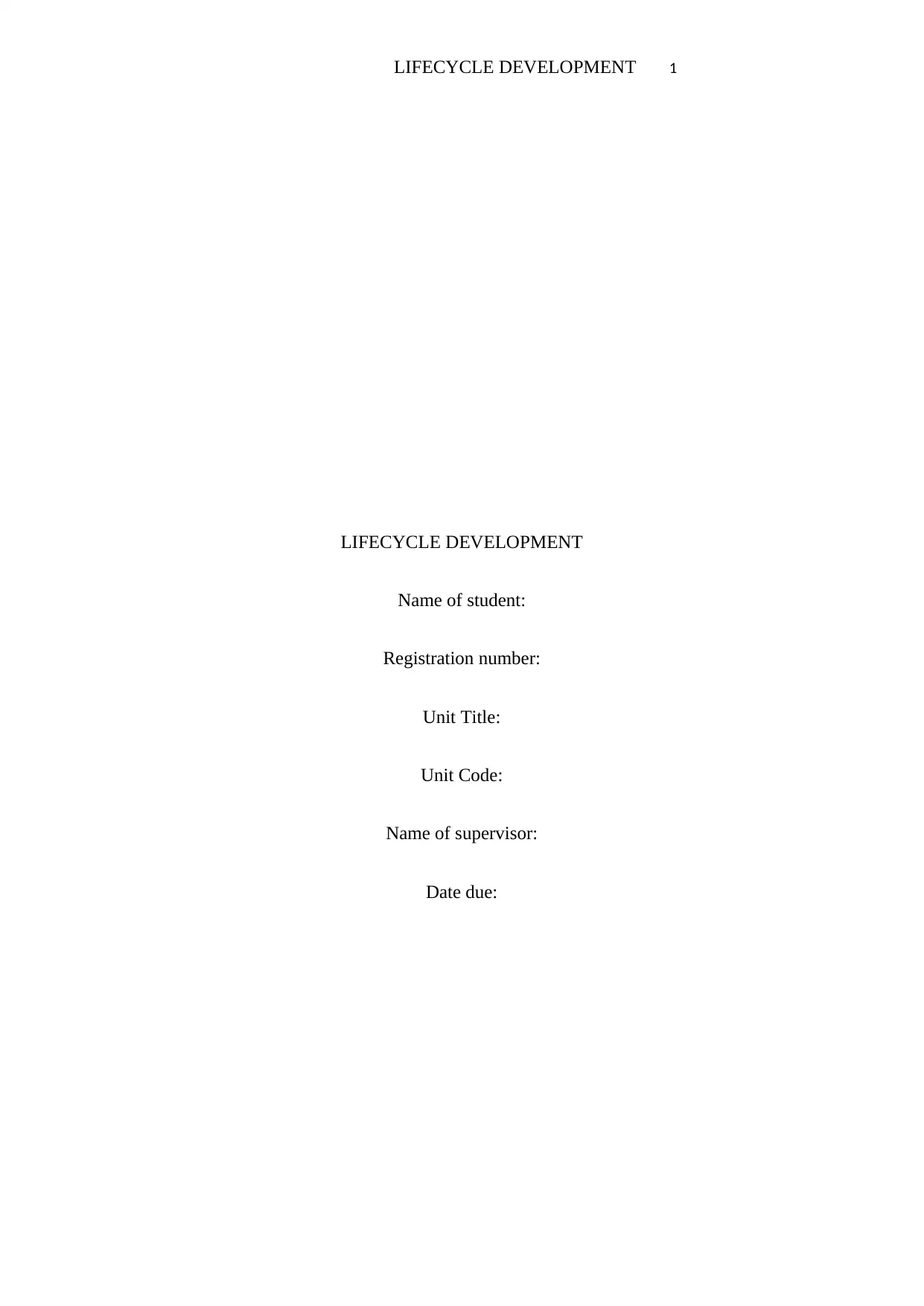
LIFECYCLE DEVELOPMENT 1
LIFECYCLE DEVELOPMENT
Name of student:
Registration number:
Unit Title:
Unit Code:
Name of supervisor:
Date due:
LIFECYCLE DEVELOPMENT
Name of student:
Registration number:
Unit Title:
Unit Code:
Name of supervisor:
Date due:
Secure Best Marks with AI Grader
Need help grading? Try our AI Grader for instant feedback on your assignments.
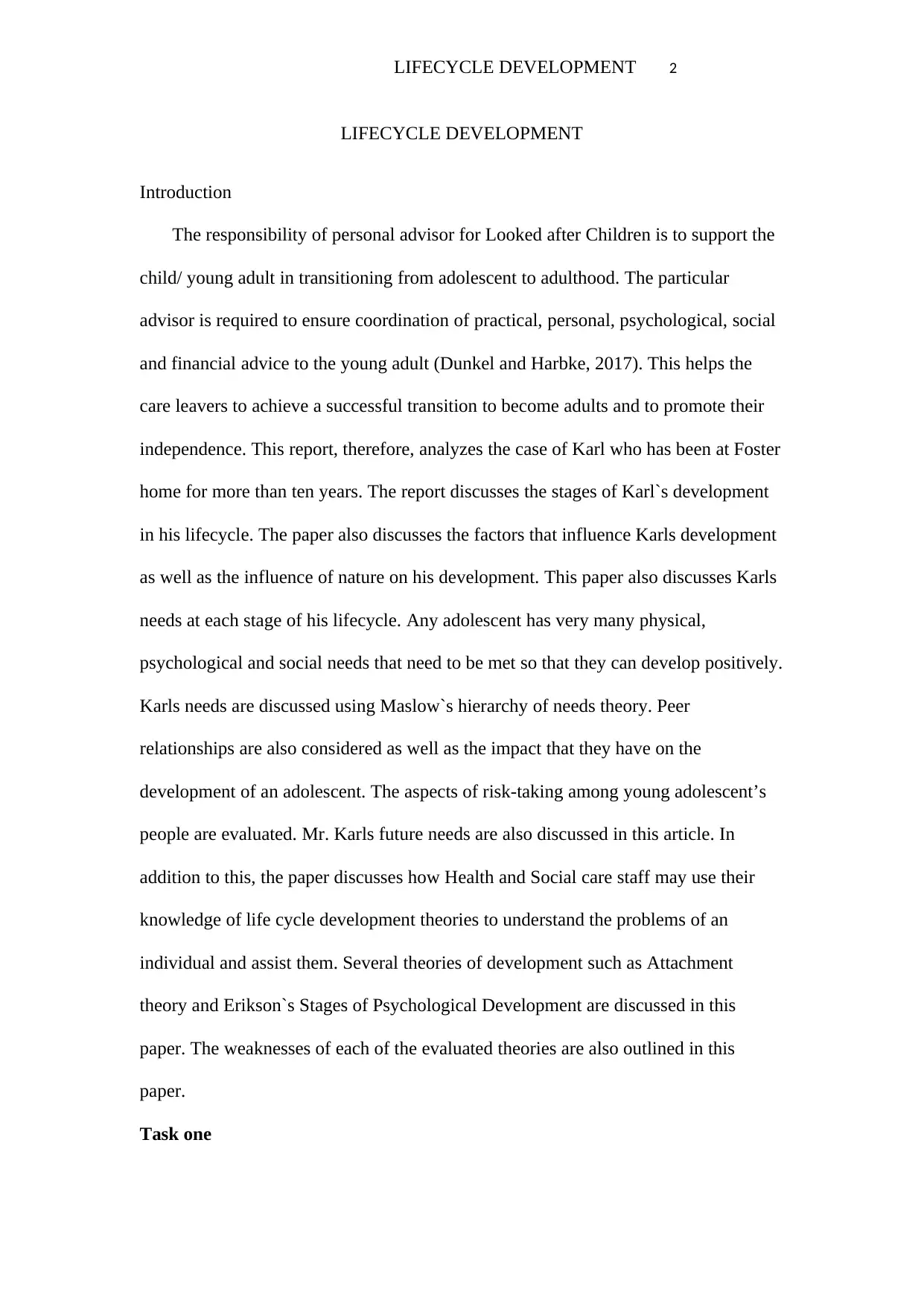
LIFECYCLE DEVELOPMENT 2
LIFECYCLE DEVELOPMENT
Introduction
The responsibility of personal advisor for Looked after Children is to support the
child/ young adult in transitioning from adolescent to adulthood. The particular
advisor is required to ensure coordination of practical, personal, psychological, social
and financial advice to the young adult (Dunkel and Harbke, 2017). This helps the
care leavers to achieve a successful transition to become adults and to promote their
independence. This report, therefore, analyzes the case of Karl who has been at Foster
home for more than ten years. The report discusses the stages of Karl`s development
in his lifecycle. The paper also discusses the factors that influence Karls development
as well as the influence of nature on his development. This paper also discusses Karls
needs at each stage of his lifecycle. Any adolescent has very many physical,
psychological and social needs that need to be met so that they can develop positively.
Karls needs are discussed using Maslow`s hierarchy of needs theory. Peer
relationships are also considered as well as the impact that they have on the
development of an adolescent. The aspects of risk-taking among young adolescent’s
people are evaluated. Mr. Karls future needs are also discussed in this article. In
addition to this, the paper discusses how Health and Social care staff may use their
knowledge of life cycle development theories to understand the problems of an
individual and assist them. Several theories of development such as Attachment
theory and Erikson`s Stages of Psychological Development are discussed in this
paper. The weaknesses of each of the evaluated theories are also outlined in this
paper.
Task one
LIFECYCLE DEVELOPMENT
Introduction
The responsibility of personal advisor for Looked after Children is to support the
child/ young adult in transitioning from adolescent to adulthood. The particular
advisor is required to ensure coordination of practical, personal, psychological, social
and financial advice to the young adult (Dunkel and Harbke, 2017). This helps the
care leavers to achieve a successful transition to become adults and to promote their
independence. This report, therefore, analyzes the case of Karl who has been at Foster
home for more than ten years. The report discusses the stages of Karl`s development
in his lifecycle. The paper also discusses the factors that influence Karls development
as well as the influence of nature on his development. This paper also discusses Karls
needs at each stage of his lifecycle. Any adolescent has very many physical,
psychological and social needs that need to be met so that they can develop positively.
Karls needs are discussed using Maslow`s hierarchy of needs theory. Peer
relationships are also considered as well as the impact that they have on the
development of an adolescent. The aspects of risk-taking among young adolescent’s
people are evaluated. Mr. Karls future needs are also discussed in this article. In
addition to this, the paper discusses how Health and Social care staff may use their
knowledge of life cycle development theories to understand the problems of an
individual and assist them. Several theories of development such as Attachment
theory and Erikson`s Stages of Psychological Development are discussed in this
paper. The weaknesses of each of the evaluated theories are also outlined in this
paper.
Task one
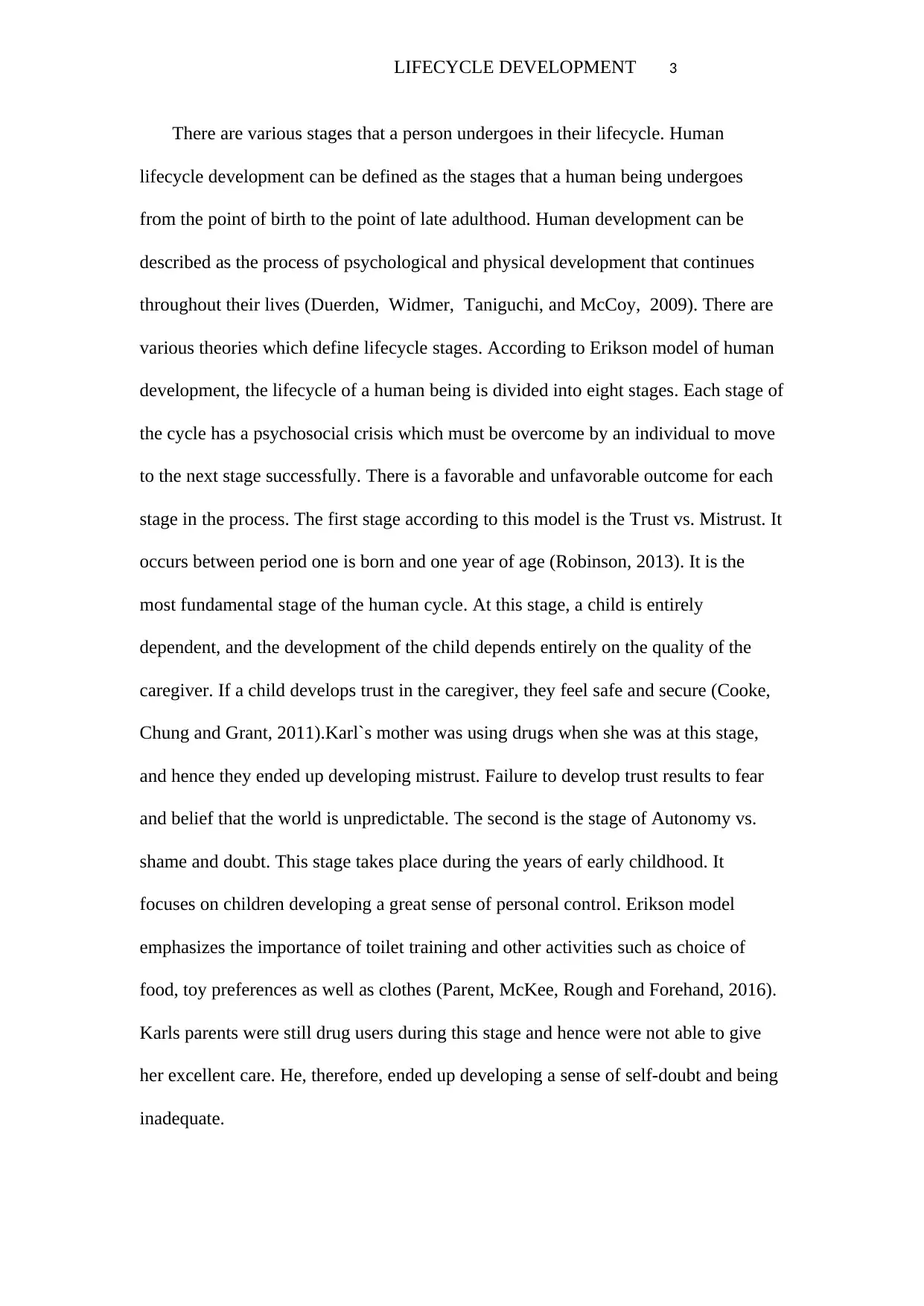
LIFECYCLE DEVELOPMENT 3
There are various stages that a person undergoes in their lifecycle. Human
lifecycle development can be defined as the stages that a human being undergoes
from the point of birth to the point of late adulthood. Human development can be
described as the process of psychological and physical development that continues
throughout their lives (Duerden, Widmer, Taniguchi, and McCoy, 2009). There are
various theories which define lifecycle stages. According to Erikson model of human
development, the lifecycle of a human being is divided into eight stages. Each stage of
the cycle has a psychosocial crisis which must be overcome by an individual to move
to the next stage successfully. There is a favorable and unfavorable outcome for each
stage in the process. The first stage according to this model is the Trust vs. Mistrust. It
occurs between period one is born and one year of age (Robinson, 2013). It is the
most fundamental stage of the human cycle. At this stage, a child is entirely
dependent, and the development of the child depends entirely on the quality of the
caregiver. If a child develops trust in the caregiver, they feel safe and secure (Cooke,
Chung and Grant, 2011).Karl`s mother was using drugs when she was at this stage,
and hence they ended up developing mistrust. Failure to develop trust results to fear
and belief that the world is unpredictable. The second is the stage of Autonomy vs.
shame and doubt. This stage takes place during the years of early childhood. It
focuses on children developing a great sense of personal control. Erikson model
emphasizes the importance of toilet training and other activities such as choice of
food, toy preferences as well as clothes (Parent, McKee, Rough and Forehand, 2016).
Karls parents were still drug users during this stage and hence were not able to give
her excellent care. He, therefore, ended up developing a sense of self-doubt and being
inadequate.
There are various stages that a person undergoes in their lifecycle. Human
lifecycle development can be defined as the stages that a human being undergoes
from the point of birth to the point of late adulthood. Human development can be
described as the process of psychological and physical development that continues
throughout their lives (Duerden, Widmer, Taniguchi, and McCoy, 2009). There are
various theories which define lifecycle stages. According to Erikson model of human
development, the lifecycle of a human being is divided into eight stages. Each stage of
the cycle has a psychosocial crisis which must be overcome by an individual to move
to the next stage successfully. There is a favorable and unfavorable outcome for each
stage in the process. The first stage according to this model is the Trust vs. Mistrust. It
occurs between period one is born and one year of age (Robinson, 2013). It is the
most fundamental stage of the human cycle. At this stage, a child is entirely
dependent, and the development of the child depends entirely on the quality of the
caregiver. If a child develops trust in the caregiver, they feel safe and secure (Cooke,
Chung and Grant, 2011).Karl`s mother was using drugs when she was at this stage,
and hence they ended up developing mistrust. Failure to develop trust results to fear
and belief that the world is unpredictable. The second is the stage of Autonomy vs.
shame and doubt. This stage takes place during the years of early childhood. It
focuses on children developing a great sense of personal control. Erikson model
emphasizes the importance of toilet training and other activities such as choice of
food, toy preferences as well as clothes (Parent, McKee, Rough and Forehand, 2016).
Karls parents were still drug users during this stage and hence were not able to give
her excellent care. He, therefore, ended up developing a sense of self-doubt and being
inadequate.
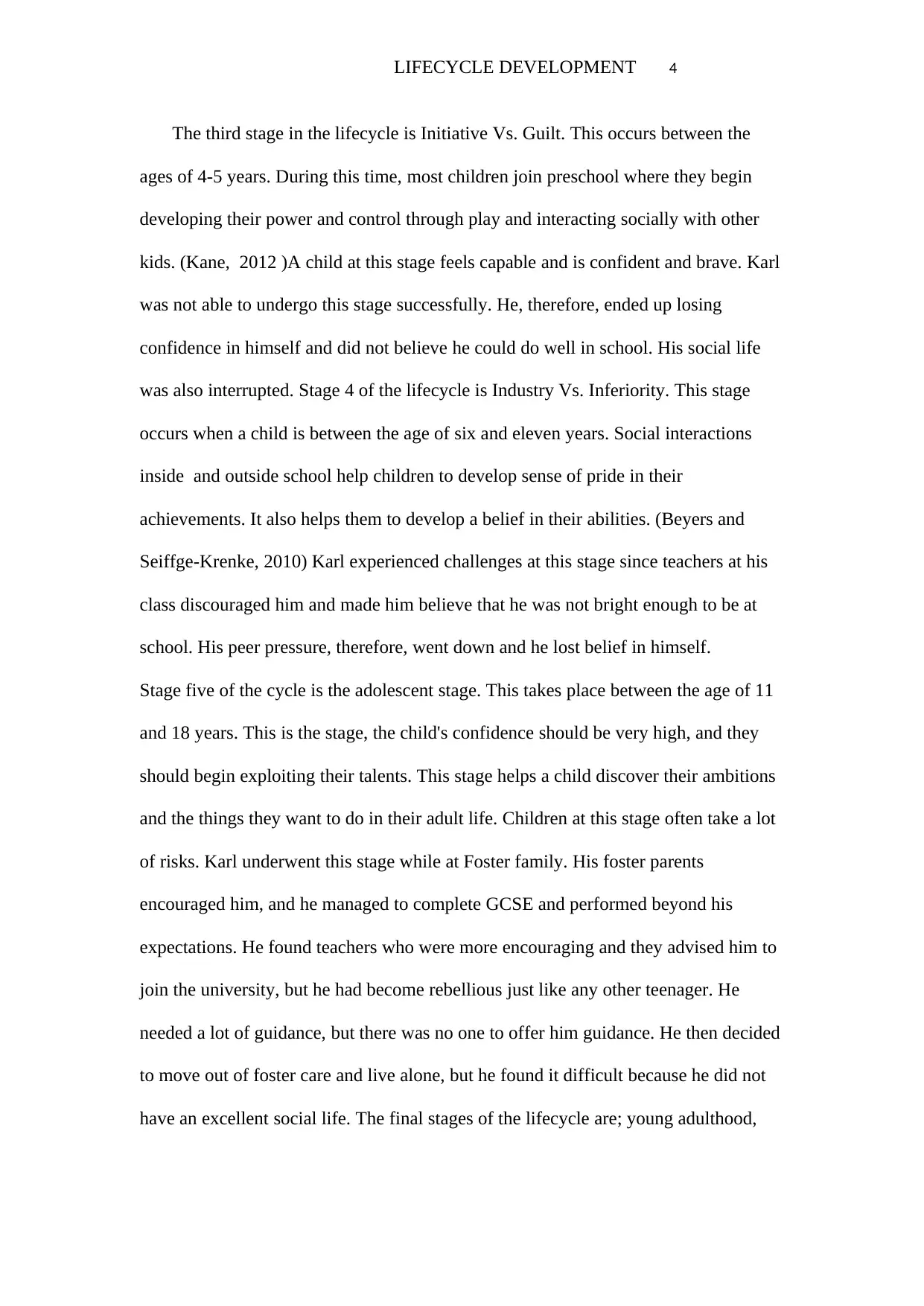
LIFECYCLE DEVELOPMENT 4
The third stage in the lifecycle is Initiative Vs. Guilt. This occurs between the
ages of 4-5 years. During this time, most children join preschool where they begin
developing their power and control through play and interacting socially with other
kids. (Kane, 2012 )A child at this stage feels capable and is confident and brave. Karl
was not able to undergo this stage successfully. He, therefore, ended up losing
confidence in himself and did not believe he could do well in school. His social life
was also interrupted. Stage 4 of the lifecycle is Industry Vs. Inferiority. This stage
occurs when a child is between the age of six and eleven years. Social interactions
inside and outside school help children to develop sense of pride in their
achievements. It also helps them to develop a belief in their abilities. (Beyers and
Seiffge-Krenke, 2010) Karl experienced challenges at this stage since teachers at his
class discouraged him and made him believe that he was not bright enough to be at
school. His peer pressure, therefore, went down and he lost belief in himself.
Stage five of the cycle is the adolescent stage. This takes place between the age of 11
and 18 years. This is the stage, the child's confidence should be very high, and they
should begin exploiting their talents. This stage helps a child discover their ambitions
and the things they want to do in their adult life. Children at this stage often take a lot
of risks. Karl underwent this stage while at Foster family. His foster parents
encouraged him, and he managed to complete GCSE and performed beyond his
expectations. He found teachers who were more encouraging and they advised him to
join the university, but he had become rebellious just like any other teenager. He
needed a lot of guidance, but there was no one to offer him guidance. He then decided
to move out of foster care and live alone, but he found it difficult because he did not
have an excellent social life. The final stages of the lifecycle are; young adulthood,
The third stage in the lifecycle is Initiative Vs. Guilt. This occurs between the
ages of 4-5 years. During this time, most children join preschool where they begin
developing their power and control through play and interacting socially with other
kids. (Kane, 2012 )A child at this stage feels capable and is confident and brave. Karl
was not able to undergo this stage successfully. He, therefore, ended up losing
confidence in himself and did not believe he could do well in school. His social life
was also interrupted. Stage 4 of the lifecycle is Industry Vs. Inferiority. This stage
occurs when a child is between the age of six and eleven years. Social interactions
inside and outside school help children to develop sense of pride in their
achievements. It also helps them to develop a belief in their abilities. (Beyers and
Seiffge-Krenke, 2010) Karl experienced challenges at this stage since teachers at his
class discouraged him and made him believe that he was not bright enough to be at
school. His peer pressure, therefore, went down and he lost belief in himself.
Stage five of the cycle is the adolescent stage. This takes place between the age of 11
and 18 years. This is the stage, the child's confidence should be very high, and they
should begin exploiting their talents. This stage helps a child discover their ambitions
and the things they want to do in their adult life. Children at this stage often take a lot
of risks. Karl underwent this stage while at Foster family. His foster parents
encouraged him, and he managed to complete GCSE and performed beyond his
expectations. He found teachers who were more encouraging and they advised him to
join the university, but he had become rebellious just like any other teenager. He
needed a lot of guidance, but there was no one to offer him guidance. He then decided
to move out of foster care and live alone, but he found it difficult because he did not
have an excellent social life. The final stages of the lifecycle are; young adulthood,
Secure Best Marks with AI Grader
Need help grading? Try our AI Grader for instant feedback on your assignments.
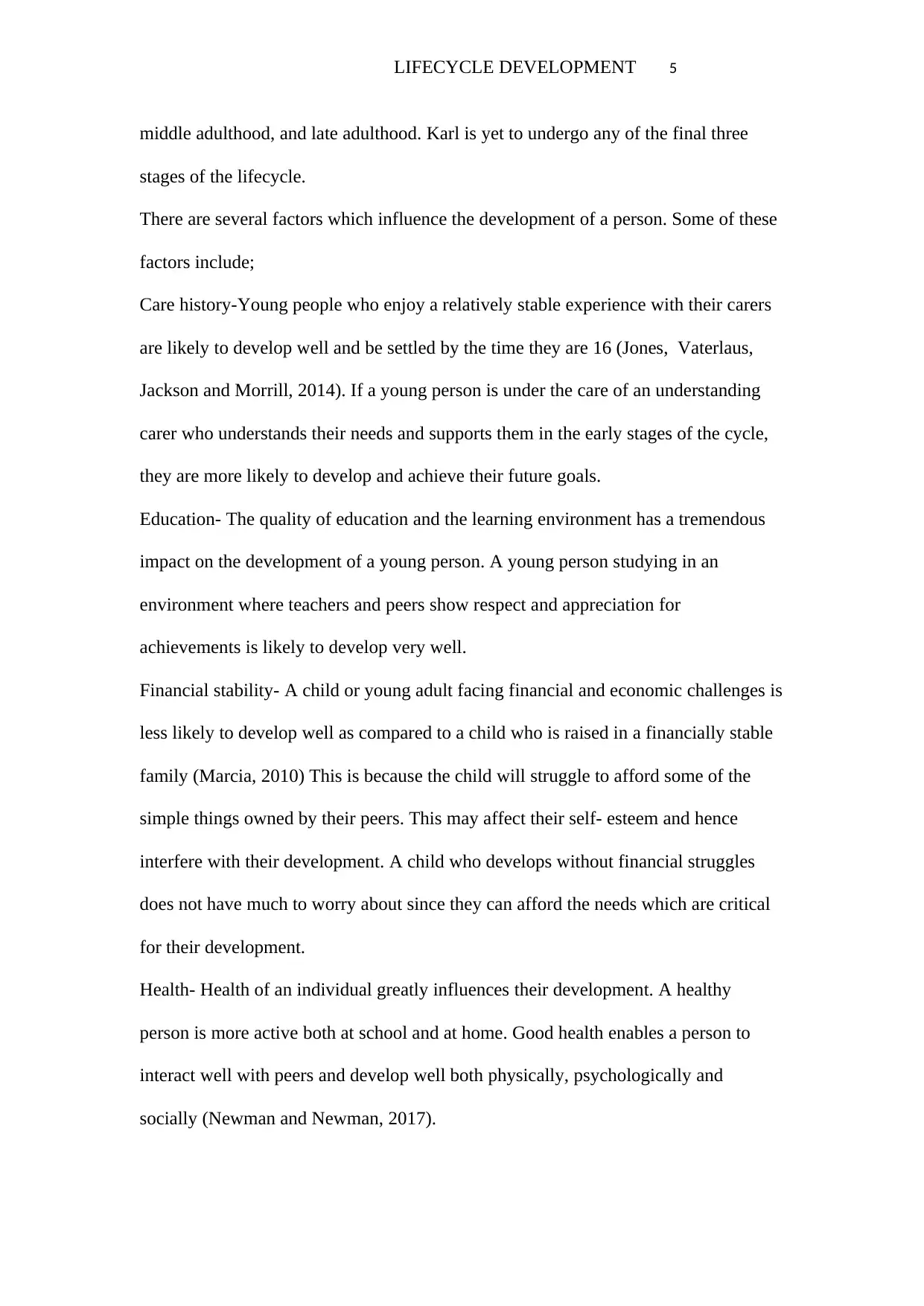
LIFECYCLE DEVELOPMENT 5
middle adulthood, and late adulthood. Karl is yet to undergo any of the final three
stages of the lifecycle.
There are several factors which influence the development of a person. Some of these
factors include;
Care history-Young people who enjoy a relatively stable experience with their carers
are likely to develop well and be settled by the time they are 16 (Jones, Vaterlaus,
Jackson and Morrill, 2014). If a young person is under the care of an understanding
carer who understands their needs and supports them in the early stages of the cycle,
they are more likely to develop and achieve their future goals.
Education- The quality of education and the learning environment has a tremendous
impact on the development of a young person. A young person studying in an
environment where teachers and peers show respect and appreciation for
achievements is likely to develop very well.
Financial stability- A child or young adult facing financial and economic challenges is
less likely to develop well as compared to a child who is raised in a financially stable
family (Marcia, 2010) This is because the child will struggle to afford some of the
simple things owned by their peers. This may affect their self- esteem and hence
interfere with their development. A child who develops without financial struggles
does not have much to worry about since they can afford the needs which are critical
for their development.
Health- Health of an individual greatly influences their development. A healthy
person is more active both at school and at home. Good health enables a person to
interact well with peers and develop well both physically, psychologically and
socially (Newman and Newman, 2017).
middle adulthood, and late adulthood. Karl is yet to undergo any of the final three
stages of the lifecycle.
There are several factors which influence the development of a person. Some of these
factors include;
Care history-Young people who enjoy a relatively stable experience with their carers
are likely to develop well and be settled by the time they are 16 (Jones, Vaterlaus,
Jackson and Morrill, 2014). If a young person is under the care of an understanding
carer who understands their needs and supports them in the early stages of the cycle,
they are more likely to develop and achieve their future goals.
Education- The quality of education and the learning environment has a tremendous
impact on the development of a young person. A young person studying in an
environment where teachers and peers show respect and appreciation for
achievements is likely to develop very well.
Financial stability- A child or young adult facing financial and economic challenges is
less likely to develop well as compared to a child who is raised in a financially stable
family (Marcia, 2010) This is because the child will struggle to afford some of the
simple things owned by their peers. This may affect their self- esteem and hence
interfere with their development. A child who develops without financial struggles
does not have much to worry about since they can afford the needs which are critical
for their development.
Health- Health of an individual greatly influences their development. A healthy
person is more active both at school and at home. Good health enables a person to
interact well with peers and develop well both physically, psychologically and
socially (Newman and Newman, 2017).
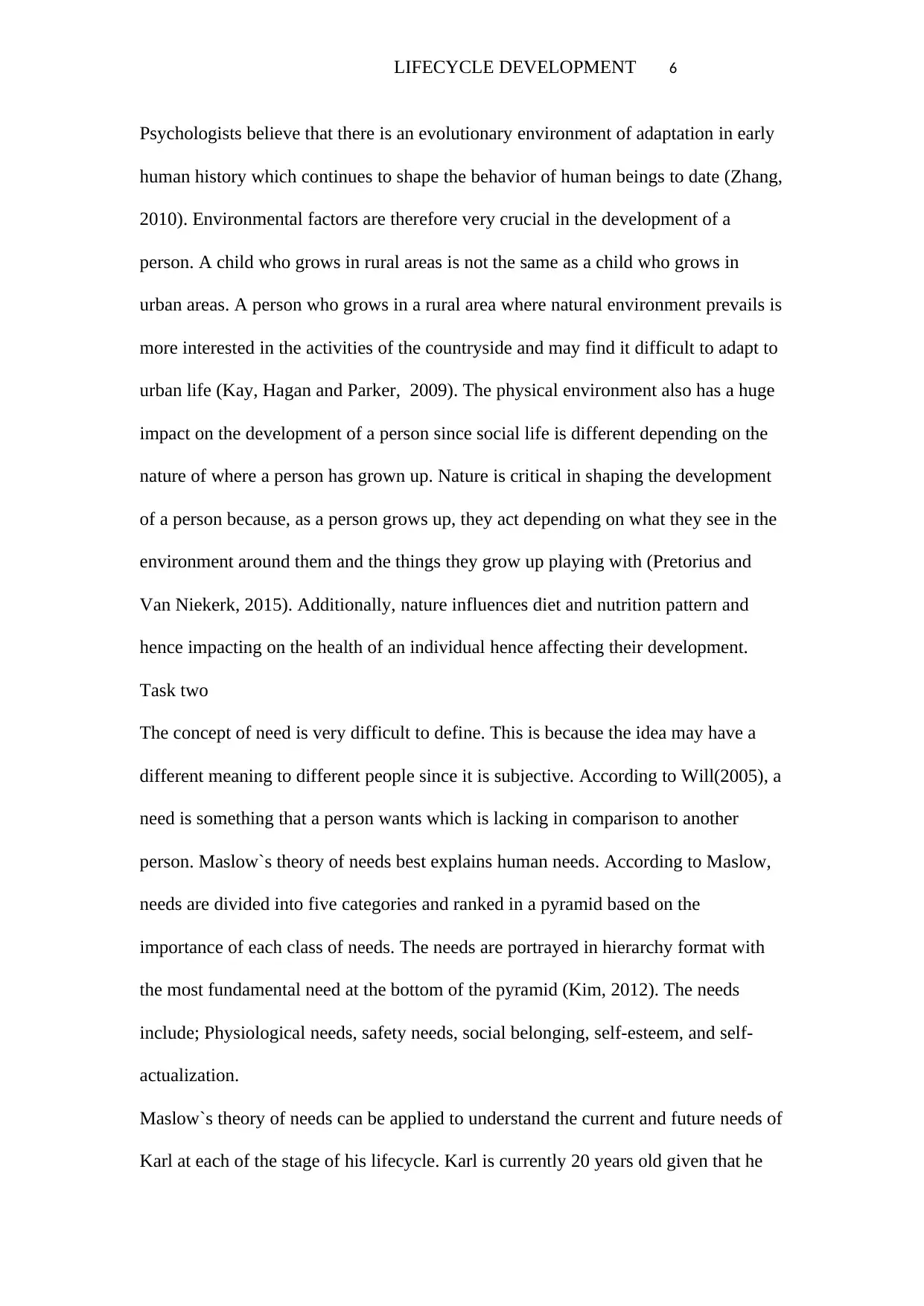
LIFECYCLE DEVELOPMENT 6
Psychologists believe that there is an evolutionary environment of adaptation in early
human history which continues to shape the behavior of human beings to date (Zhang,
2010). Environmental factors are therefore very crucial in the development of a
person. A child who grows in rural areas is not the same as a child who grows in
urban areas. A person who grows in a rural area where natural environment prevails is
more interested in the activities of the countryside and may find it difficult to adapt to
urban life (Kay, Hagan and Parker, 2009). The physical environment also has a huge
impact on the development of a person since social life is different depending on the
nature of where a person has grown up. Nature is critical in shaping the development
of a person because, as a person grows up, they act depending on what they see in the
environment around them and the things they grow up playing with (Pretorius and
Van Niekerk, 2015). Additionally, nature influences diet and nutrition pattern and
hence impacting on the health of an individual hence affecting their development.
Task two
The concept of need is very difficult to define. This is because the idea may have a
different meaning to different people since it is subjective. According to Will(2005), a
need is something that a person wants which is lacking in comparison to another
person. Maslow`s theory of needs best explains human needs. According to Maslow,
needs are divided into five categories and ranked in a pyramid based on the
importance of each class of needs. The needs are portrayed in hierarchy format with
the most fundamental need at the bottom of the pyramid (Kim, 2012). The needs
include; Physiological needs, safety needs, social belonging, self-esteem, and self-
actualization.
Maslow`s theory of needs can be applied to understand the current and future needs of
Karl at each of the stage of his lifecycle. Karl is currently 20 years old given that he
Psychologists believe that there is an evolutionary environment of adaptation in early
human history which continues to shape the behavior of human beings to date (Zhang,
2010). Environmental factors are therefore very crucial in the development of a
person. A child who grows in rural areas is not the same as a child who grows in
urban areas. A person who grows in a rural area where natural environment prevails is
more interested in the activities of the countryside and may find it difficult to adapt to
urban life (Kay, Hagan and Parker, 2009). The physical environment also has a huge
impact on the development of a person since social life is different depending on the
nature of where a person has grown up. Nature is critical in shaping the development
of a person because, as a person grows up, they act depending on what they see in the
environment around them and the things they grow up playing with (Pretorius and
Van Niekerk, 2015). Additionally, nature influences diet and nutrition pattern and
hence impacting on the health of an individual hence affecting their development.
Task two
The concept of need is very difficult to define. This is because the idea may have a
different meaning to different people since it is subjective. According to Will(2005), a
need is something that a person wants which is lacking in comparison to another
person. Maslow`s theory of needs best explains human needs. According to Maslow,
needs are divided into five categories and ranked in a pyramid based on the
importance of each class of needs. The needs are portrayed in hierarchy format with
the most fundamental need at the bottom of the pyramid (Kim, 2012). The needs
include; Physiological needs, safety needs, social belonging, self-esteem, and self-
actualization.
Maslow`s theory of needs can be applied to understand the current and future needs of
Karl at each of the stage of his lifecycle. Karl is currently 20 years old given that he
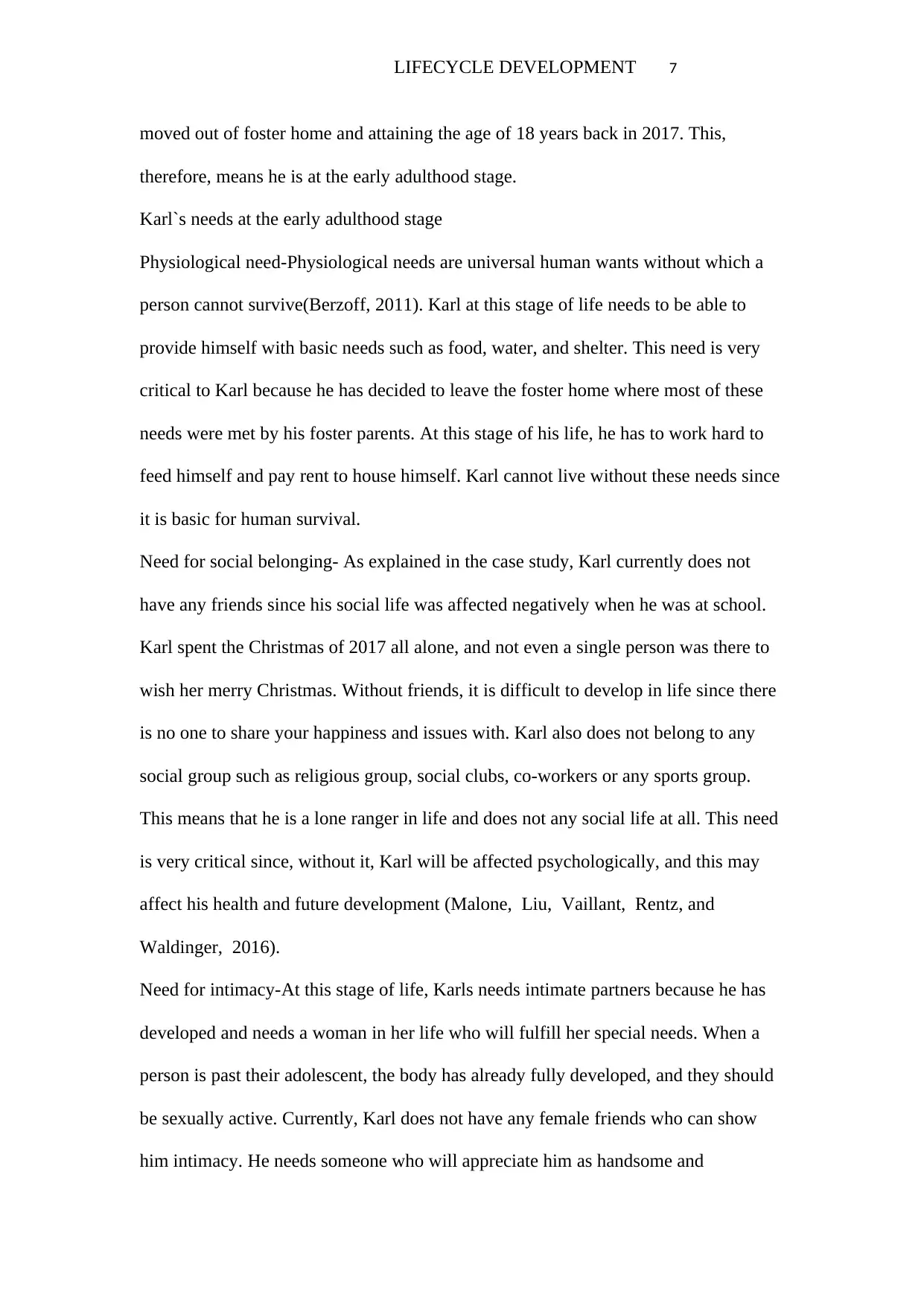
LIFECYCLE DEVELOPMENT 7
moved out of foster home and attaining the age of 18 years back in 2017. This,
therefore, means he is at the early adulthood stage.
Karl`s needs at the early adulthood stage
Physiological need-Physiological needs are universal human wants without which a
person cannot survive(Berzoff, 2011). Karl at this stage of life needs to be able to
provide himself with basic needs such as food, water, and shelter. This need is very
critical to Karl because he has decided to leave the foster home where most of these
needs were met by his foster parents. At this stage of his life, he has to work hard to
feed himself and pay rent to house himself. Karl cannot live without these needs since
it is basic for human survival.
Need for social belonging- As explained in the case study, Karl currently does not
have any friends since his social life was affected negatively when he was at school.
Karl spent the Christmas of 2017 all alone, and not even a single person was there to
wish her merry Christmas. Without friends, it is difficult to develop in life since there
is no one to share your happiness and issues with. Karl also does not belong to any
social group such as religious group, social clubs, co-workers or any sports group.
This means that he is a lone ranger in life and does not any social life at all. This need
is very critical since, without it, Karl will be affected psychologically, and this may
affect his health and future development (Malone, Liu, Vaillant, Rentz, and
Waldinger, 2016).
Need for intimacy-At this stage of life, Karls needs intimate partners because he has
developed and needs a woman in her life who will fulfill her special needs. When a
person is past their adolescent, the body has already fully developed, and they should
be sexually active. Currently, Karl does not have any female friends who can show
him intimacy. He needs someone who will appreciate him as handsome and
moved out of foster home and attaining the age of 18 years back in 2017. This,
therefore, means he is at the early adulthood stage.
Karl`s needs at the early adulthood stage
Physiological need-Physiological needs are universal human wants without which a
person cannot survive(Berzoff, 2011). Karl at this stage of life needs to be able to
provide himself with basic needs such as food, water, and shelter. This need is very
critical to Karl because he has decided to leave the foster home where most of these
needs were met by his foster parents. At this stage of his life, he has to work hard to
feed himself and pay rent to house himself. Karl cannot live without these needs since
it is basic for human survival.
Need for social belonging- As explained in the case study, Karl currently does not
have any friends since his social life was affected negatively when he was at school.
Karl spent the Christmas of 2017 all alone, and not even a single person was there to
wish her merry Christmas. Without friends, it is difficult to develop in life since there
is no one to share your happiness and issues with. Karl also does not belong to any
social group such as religious group, social clubs, co-workers or any sports group.
This means that he is a lone ranger in life and does not any social life at all. This need
is very critical since, without it, Karl will be affected psychologically, and this may
affect his health and future development (Malone, Liu, Vaillant, Rentz, and
Waldinger, 2016).
Need for intimacy-At this stage of life, Karls needs intimate partners because he has
developed and needs a woman in her life who will fulfill her special needs. When a
person is past their adolescent, the body has already fully developed, and they should
be sexually active. Currently, Karl does not have any female friends who can show
him intimacy. He needs someone who will appreciate him as handsome and
Paraphrase This Document
Need a fresh take? Get an instant paraphrase of this document with our AI Paraphraser
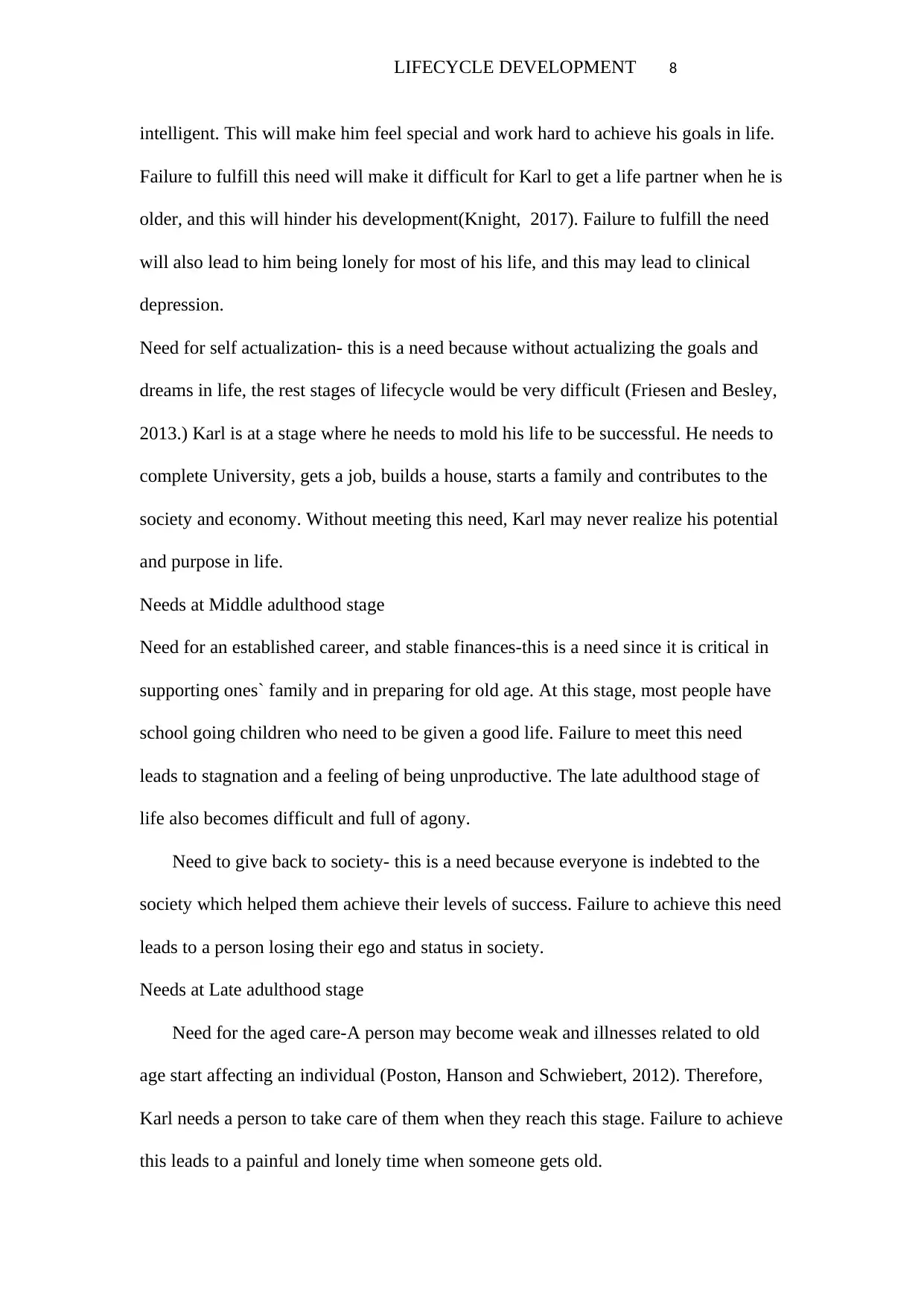
LIFECYCLE DEVELOPMENT 8
intelligent. This will make him feel special and work hard to achieve his goals in life.
Failure to fulfill this need will make it difficult for Karl to get a life partner when he is
older, and this will hinder his development(Knight, 2017). Failure to fulfill the need
will also lead to him being lonely for most of his life, and this may lead to clinical
depression.
Need for self actualization- this is a need because without actualizing the goals and
dreams in life, the rest stages of lifecycle would be very difficult (Friesen and Besley,
2013.) Karl is at a stage where he needs to mold his life to be successful. He needs to
complete University, gets a job, builds a house, starts a family and contributes to the
society and economy. Without meeting this need, Karl may never realize his potential
and purpose in life.
Needs at Middle adulthood stage
Need for an established career, and stable finances-this is a need since it is critical in
supporting ones` family and in preparing for old age. At this stage, most people have
school going children who need to be given a good life. Failure to meet this need
leads to stagnation and a feeling of being unproductive. The late adulthood stage of
life also becomes difficult and full of agony.
Need to give back to society- this is a need because everyone is indebted to the
society which helped them achieve their levels of success. Failure to achieve this need
leads to a person losing their ego and status in society.
Needs at Late adulthood stage
Need for the aged care-A person may become weak and illnesses related to old
age start affecting an individual (Poston, Hanson and Schwiebert, 2012). Therefore,
Karl needs a person to take care of them when they reach this stage. Failure to achieve
this leads to a painful and lonely time when someone gets old.
intelligent. This will make him feel special and work hard to achieve his goals in life.
Failure to fulfill this need will make it difficult for Karl to get a life partner when he is
older, and this will hinder his development(Knight, 2017). Failure to fulfill the need
will also lead to him being lonely for most of his life, and this may lead to clinical
depression.
Need for self actualization- this is a need because without actualizing the goals and
dreams in life, the rest stages of lifecycle would be very difficult (Friesen and Besley,
2013.) Karl is at a stage where he needs to mold his life to be successful. He needs to
complete University, gets a job, builds a house, starts a family and contributes to the
society and economy. Without meeting this need, Karl may never realize his potential
and purpose in life.
Needs at Middle adulthood stage
Need for an established career, and stable finances-this is a need since it is critical in
supporting ones` family and in preparing for old age. At this stage, most people have
school going children who need to be given a good life. Failure to meet this need
leads to stagnation and a feeling of being unproductive. The late adulthood stage of
life also becomes difficult and full of agony.
Need to give back to society- this is a need because everyone is indebted to the
society which helped them achieve their levels of success. Failure to achieve this need
leads to a person losing their ego and status in society.
Needs at Late adulthood stage
Need for the aged care-A person may become weak and illnesses related to old
age start affecting an individual (Poston, Hanson and Schwiebert, 2012). Therefore,
Karl needs a person to take care of them when they reach this stage. Failure to achieve
this leads to a painful and lonely time when someone gets old.
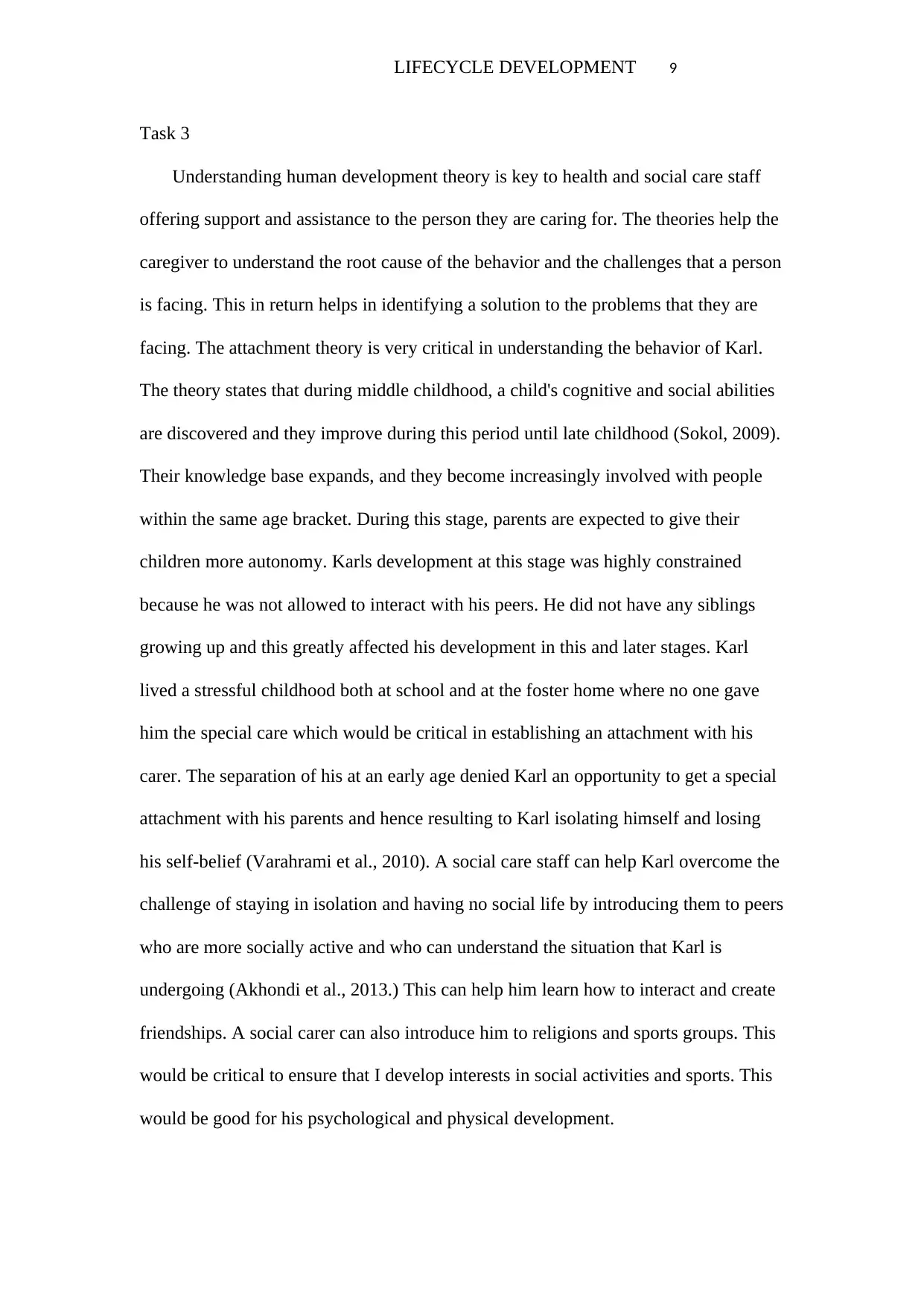
LIFECYCLE DEVELOPMENT 9
Task 3
Understanding human development theory is key to health and social care staff
offering support and assistance to the person they are caring for. The theories help the
caregiver to understand the root cause of the behavior and the challenges that a person
is facing. This in return helps in identifying a solution to the problems that they are
facing. The attachment theory is very critical in understanding the behavior of Karl.
The theory states that during middle childhood, a child's cognitive and social abilities
are discovered and they improve during this period until late childhood (Sokol, 2009).
Their knowledge base expands, and they become increasingly involved with people
within the same age bracket. During this stage, parents are expected to give their
children more autonomy. Karls development at this stage was highly constrained
because he was not allowed to interact with his peers. He did not have any siblings
growing up and this greatly affected his development in this and later stages. Karl
lived a stressful childhood both at school and at the foster home where no one gave
him the special care which would be critical in establishing an attachment with his
carer. The separation of his at an early age denied Karl an opportunity to get a special
attachment with his parents and hence resulting to Karl isolating himself and losing
his self-belief (Varahrami et al., 2010). A social care staff can help Karl overcome the
challenge of staying in isolation and having no social life by introducing them to peers
who are more socially active and who can understand the situation that Karl is
undergoing (Akhondi et al., 2013.) This can help him learn how to interact and create
friendships. A social carer can also introduce him to religions and sports groups. This
would be critical to ensure that I develop interests in social activities and sports. This
would be good for his psychological and physical development.
Task 3
Understanding human development theory is key to health and social care staff
offering support and assistance to the person they are caring for. The theories help the
caregiver to understand the root cause of the behavior and the challenges that a person
is facing. This in return helps in identifying a solution to the problems that they are
facing. The attachment theory is very critical in understanding the behavior of Karl.
The theory states that during middle childhood, a child's cognitive and social abilities
are discovered and they improve during this period until late childhood (Sokol, 2009).
Their knowledge base expands, and they become increasingly involved with people
within the same age bracket. During this stage, parents are expected to give their
children more autonomy. Karls development at this stage was highly constrained
because he was not allowed to interact with his peers. He did not have any siblings
growing up and this greatly affected his development in this and later stages. Karl
lived a stressful childhood both at school and at the foster home where no one gave
him the special care which would be critical in establishing an attachment with his
carer. The separation of his at an early age denied Karl an opportunity to get a special
attachment with his parents and hence resulting to Karl isolating himself and losing
his self-belief (Varahrami et al., 2010). A social care staff can help Karl overcome the
challenge of staying in isolation and having no social life by introducing them to peers
who are more socially active and who can understand the situation that Karl is
undergoing (Akhondi et al., 2013.) This can help him learn how to interact and create
friendships. A social carer can also introduce him to religions and sports groups. This
would be critical to ensure that I develop interests in social activities and sports. This
would be good for his psychological and physical development.
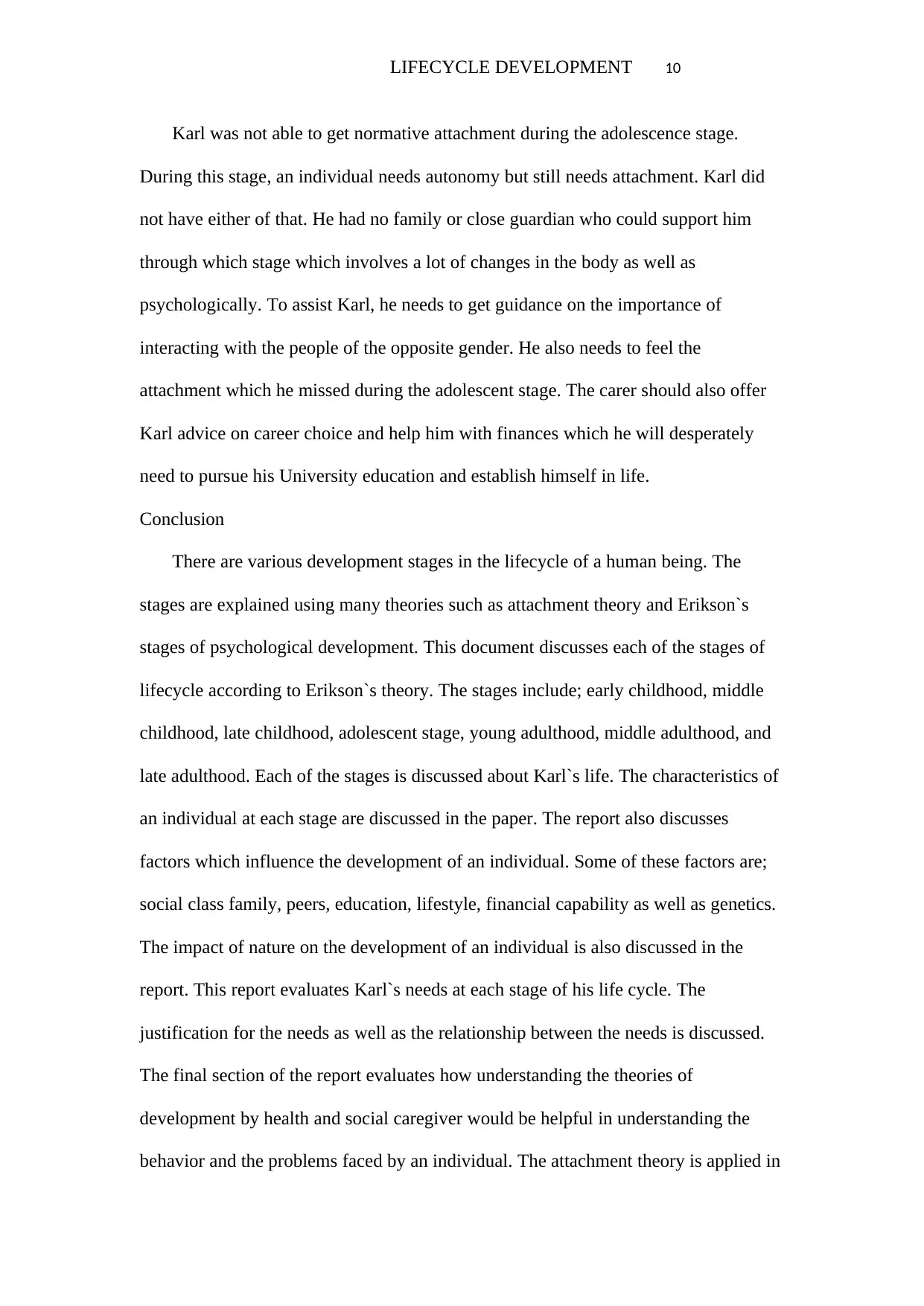
LIFECYCLE DEVELOPMENT 10
Karl was not able to get normative attachment during the adolescence stage.
During this stage, an individual needs autonomy but still needs attachment. Karl did
not have either of that. He had no family or close guardian who could support him
through which stage which involves a lot of changes in the body as well as
psychologically. To assist Karl, he needs to get guidance on the importance of
interacting with the people of the opposite gender. He also needs to feel the
attachment which he missed during the adolescent stage. The carer should also offer
Karl advice on career choice and help him with finances which he will desperately
need to pursue his University education and establish himself in life.
Conclusion
There are various development stages in the lifecycle of a human being. The
stages are explained using many theories such as attachment theory and Erikson`s
stages of psychological development. This document discusses each of the stages of
lifecycle according to Erikson`s theory. The stages include; early childhood, middle
childhood, late childhood, adolescent stage, young adulthood, middle adulthood, and
late adulthood. Each of the stages is discussed about Karl`s life. The characteristics of
an individual at each stage are discussed in the paper. The report also discusses
factors which influence the development of an individual. Some of these factors are;
social class family, peers, education, lifestyle, financial capability as well as genetics.
The impact of nature on the development of an individual is also discussed in the
report. This report evaluates Karl`s needs at each stage of his life cycle. The
justification for the needs as well as the relationship between the needs is discussed.
The final section of the report evaluates how understanding the theories of
development by health and social caregiver would be helpful in understanding the
behavior and the problems faced by an individual. The attachment theory is applied in
Karl was not able to get normative attachment during the adolescence stage.
During this stage, an individual needs autonomy but still needs attachment. Karl did
not have either of that. He had no family or close guardian who could support him
through which stage which involves a lot of changes in the body as well as
psychologically. To assist Karl, he needs to get guidance on the importance of
interacting with the people of the opposite gender. He also needs to feel the
attachment which he missed during the adolescent stage. The carer should also offer
Karl advice on career choice and help him with finances which he will desperately
need to pursue his University education and establish himself in life.
Conclusion
There are various development stages in the lifecycle of a human being. The
stages are explained using many theories such as attachment theory and Erikson`s
stages of psychological development. This document discusses each of the stages of
lifecycle according to Erikson`s theory. The stages include; early childhood, middle
childhood, late childhood, adolescent stage, young adulthood, middle adulthood, and
late adulthood. Each of the stages is discussed about Karl`s life. The characteristics of
an individual at each stage are discussed in the paper. The report also discusses
factors which influence the development of an individual. Some of these factors are;
social class family, peers, education, lifestyle, financial capability as well as genetics.
The impact of nature on the development of an individual is also discussed in the
report. This report evaluates Karl`s needs at each stage of his life cycle. The
justification for the needs as well as the relationship between the needs is discussed.
The final section of the report evaluates how understanding the theories of
development by health and social caregiver would be helpful in understanding the
behavior and the problems faced by an individual. The attachment theory is applied in
Secure Best Marks with AI Grader
Need help grading? Try our AI Grader for instant feedback on your assignments.
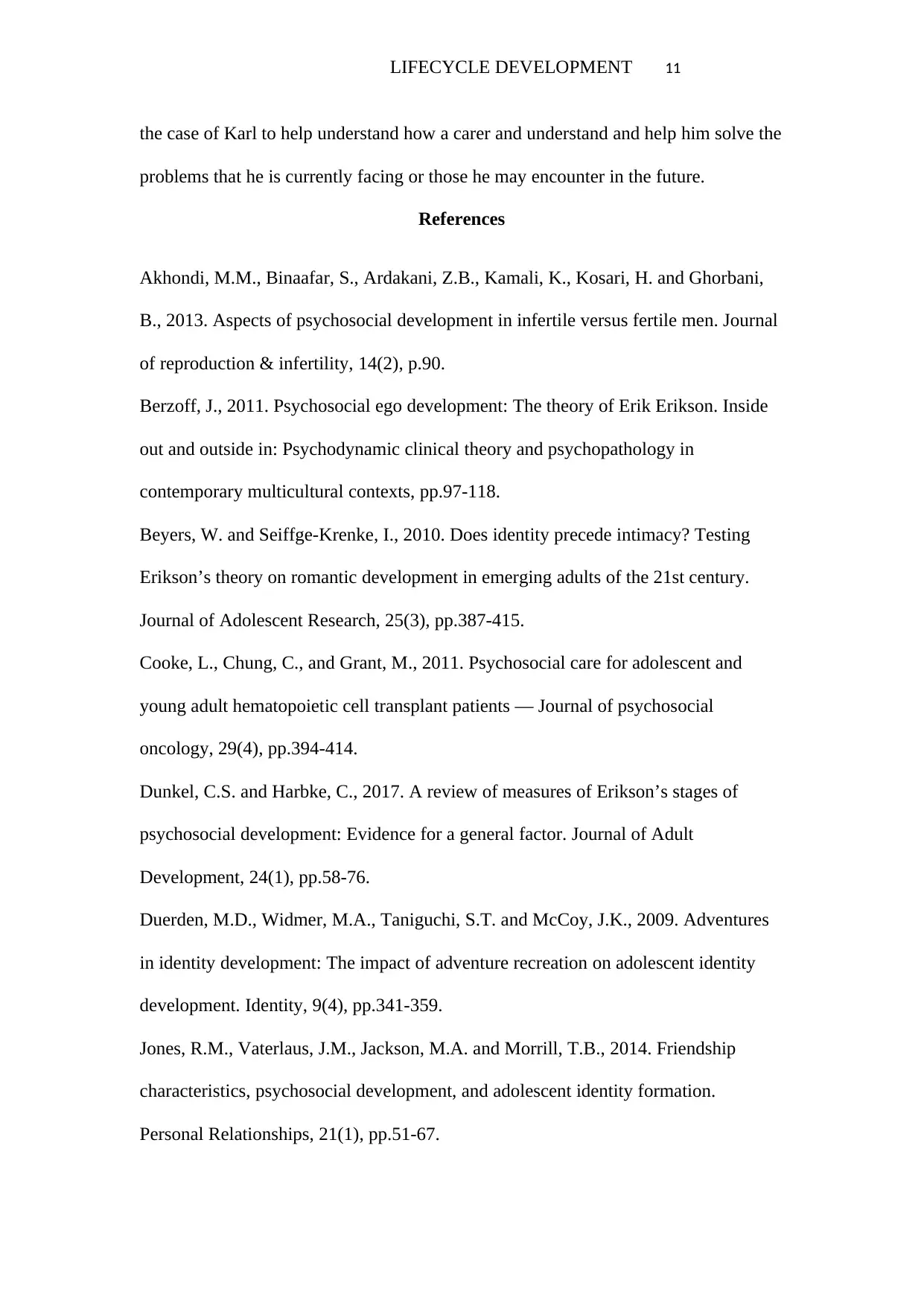
LIFECYCLE DEVELOPMENT 11
the case of Karl to help understand how a carer and understand and help him solve the
problems that he is currently facing or those he may encounter in the future.
References
Akhondi, M.M., Binaafar, S., Ardakani, Z.B., Kamali, K., Kosari, H. and Ghorbani,
B., 2013. Aspects of psychosocial development in infertile versus fertile men. Journal
of reproduction & infertility, 14(2), p.90.
Berzoff, J., 2011. Psychosocial ego development: The theory of Erik Erikson. Inside
out and outside in: Psychodynamic clinical theory and psychopathology in
contemporary multicultural contexts, pp.97-118.
Beyers, W. and Seiffge-Krenke, I., 2010. Does identity precede intimacy? Testing
Erikson’s theory on romantic development in emerging adults of the 21st century.
Journal of Adolescent Research, 25(3), pp.387-415.
Cooke, L., Chung, C., and Grant, M., 2011. Psychosocial care for adolescent and
young adult hematopoietic cell transplant patients — Journal of psychosocial
oncology, 29(4), pp.394-414.
Dunkel, C.S. and Harbke, C., 2017. A review of measures of Erikson’s stages of
psychosocial development: Evidence for a general factor. Journal of Adult
Development, 24(1), pp.58-76.
Duerden, M.D., Widmer, M.A., Taniguchi, S.T. and McCoy, J.K., 2009. Adventures
in identity development: The impact of adventure recreation on adolescent identity
development. Identity, 9(4), pp.341-359.
Jones, R.M., Vaterlaus, J.M., Jackson, M.A. and Morrill, T.B., 2014. Friendship
characteristics, psychosocial development, and adolescent identity formation.
Personal Relationships, 21(1), pp.51-67.
the case of Karl to help understand how a carer and understand and help him solve the
problems that he is currently facing or those he may encounter in the future.
References
Akhondi, M.M., Binaafar, S., Ardakani, Z.B., Kamali, K., Kosari, H. and Ghorbani,
B., 2013. Aspects of psychosocial development in infertile versus fertile men. Journal
of reproduction & infertility, 14(2), p.90.
Berzoff, J., 2011. Psychosocial ego development: The theory of Erik Erikson. Inside
out and outside in: Psychodynamic clinical theory and psychopathology in
contemporary multicultural contexts, pp.97-118.
Beyers, W. and Seiffge-Krenke, I., 2010. Does identity precede intimacy? Testing
Erikson’s theory on romantic development in emerging adults of the 21st century.
Journal of Adolescent Research, 25(3), pp.387-415.
Cooke, L., Chung, C., and Grant, M., 2011. Psychosocial care for adolescent and
young adult hematopoietic cell transplant patients — Journal of psychosocial
oncology, 29(4), pp.394-414.
Dunkel, C.S. and Harbke, C., 2017. A review of measures of Erikson’s stages of
psychosocial development: Evidence for a general factor. Journal of Adult
Development, 24(1), pp.58-76.
Duerden, M.D., Widmer, M.A., Taniguchi, S.T. and McCoy, J.K., 2009. Adventures
in identity development: The impact of adventure recreation on adolescent identity
development. Identity, 9(4), pp.341-359.
Jones, R.M., Vaterlaus, J.M., Jackson, M.A. and Morrill, T.B., 2014. Friendship
characteristics, psychosocial development, and adolescent identity formation.
Personal Relationships, 21(1), pp.51-67.
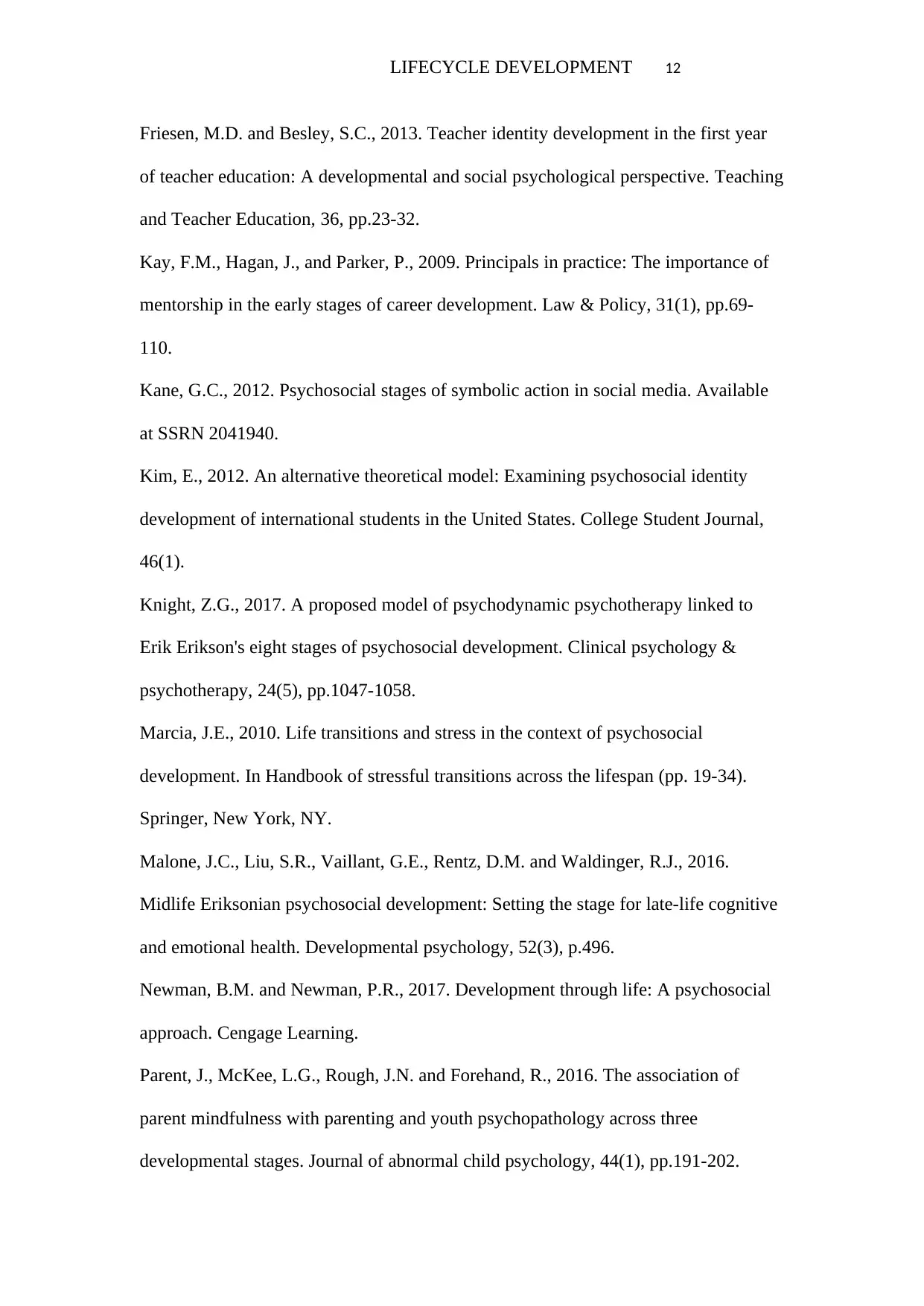
LIFECYCLE DEVELOPMENT 12
Friesen, M.D. and Besley, S.C., 2013. Teacher identity development in the first year
of teacher education: A developmental and social psychological perspective. Teaching
and Teacher Education, 36, pp.23-32.
Kay, F.M., Hagan, J., and Parker, P., 2009. Principals in practice: The importance of
mentorship in the early stages of career development. Law & Policy, 31(1), pp.69-
110.
Kane, G.C., 2012. Psychosocial stages of symbolic action in social media. Available
at SSRN 2041940.
Kim, E., 2012. An alternative theoretical model: Examining psychosocial identity
development of international students in the United States. College Student Journal,
46(1).
Knight, Z.G., 2017. A proposed model of psychodynamic psychotherapy linked to
Erik Erikson's eight stages of psychosocial development. Clinical psychology &
psychotherapy, 24(5), pp.1047-1058.
Marcia, J.E., 2010. Life transitions and stress in the context of psychosocial
development. In Handbook of stressful transitions across the lifespan (pp. 19-34).
Springer, New York, NY.
Malone, J.C., Liu, S.R., Vaillant, G.E., Rentz, D.M. and Waldinger, R.J., 2016.
Midlife Eriksonian psychosocial development: Setting the stage for late-life cognitive
and emotional health. Developmental psychology, 52(3), p.496.
Newman, B.M. and Newman, P.R., 2017. Development through life: A psychosocial
approach. Cengage Learning.
Parent, J., McKee, L.G., Rough, J.N. and Forehand, R., 2016. The association of
parent mindfulness with parenting and youth psychopathology across three
developmental stages. Journal of abnormal child psychology, 44(1), pp.191-202.
Friesen, M.D. and Besley, S.C., 2013. Teacher identity development in the first year
of teacher education: A developmental and social psychological perspective. Teaching
and Teacher Education, 36, pp.23-32.
Kay, F.M., Hagan, J., and Parker, P., 2009. Principals in practice: The importance of
mentorship in the early stages of career development. Law & Policy, 31(1), pp.69-
110.
Kane, G.C., 2012. Psychosocial stages of symbolic action in social media. Available
at SSRN 2041940.
Kim, E., 2012. An alternative theoretical model: Examining psychosocial identity
development of international students in the United States. College Student Journal,
46(1).
Knight, Z.G., 2017. A proposed model of psychodynamic psychotherapy linked to
Erik Erikson's eight stages of psychosocial development. Clinical psychology &
psychotherapy, 24(5), pp.1047-1058.
Marcia, J.E., 2010. Life transitions and stress in the context of psychosocial
development. In Handbook of stressful transitions across the lifespan (pp. 19-34).
Springer, New York, NY.
Malone, J.C., Liu, S.R., Vaillant, G.E., Rentz, D.M. and Waldinger, R.J., 2016.
Midlife Eriksonian psychosocial development: Setting the stage for late-life cognitive
and emotional health. Developmental psychology, 52(3), p.496.
Newman, B.M. and Newman, P.R., 2017. Development through life: A psychosocial
approach. Cengage Learning.
Parent, J., McKee, L.G., Rough, J.N. and Forehand, R., 2016. The association of
parent mindfulness with parenting and youth psychopathology across three
developmental stages. Journal of abnormal child psychology, 44(1), pp.191-202.
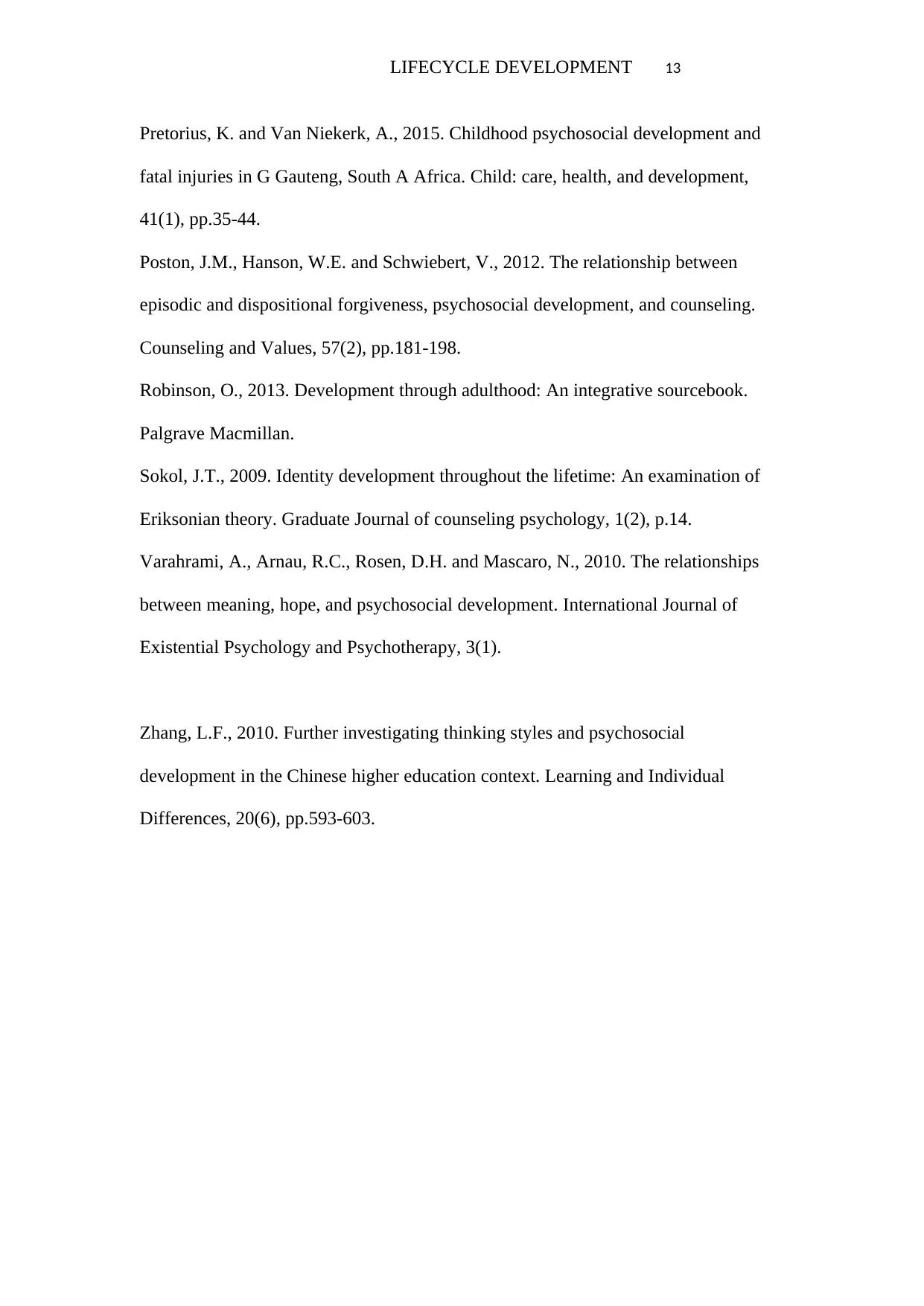
LIFECYCLE DEVELOPMENT 13
Pretorius, K. and Van Niekerk, A., 2015. Childhood psychosocial development and
fatal injuries in G Gauteng, South A Africa. Child: care, health, and development,
41(1), pp.35-44.
Poston, J.M., Hanson, W.E. and Schwiebert, V., 2012. The relationship between
episodic and dispositional forgiveness, psychosocial development, and counseling.
Counseling and Values, 57(2), pp.181-198.
Robinson, O., 2013. Development through adulthood: An integrative sourcebook.
Palgrave Macmillan.
Sokol, J.T., 2009. Identity development throughout the lifetime: An examination of
Eriksonian theory. Graduate Journal of counseling psychology, 1(2), p.14.
Varahrami, A., Arnau, R.C., Rosen, D.H. and Mascaro, N., 2010. The relationships
between meaning, hope, and psychosocial development. International Journal of
Existential Psychology and Psychotherapy, 3(1).
Zhang, L.F., 2010. Further investigating thinking styles and psychosocial
development in the Chinese higher education context. Learning and Individual
Differences, 20(6), pp.593-603.
Pretorius, K. and Van Niekerk, A., 2015. Childhood psychosocial development and
fatal injuries in G Gauteng, South A Africa. Child: care, health, and development,
41(1), pp.35-44.
Poston, J.M., Hanson, W.E. and Schwiebert, V., 2012. The relationship between
episodic and dispositional forgiveness, psychosocial development, and counseling.
Counseling and Values, 57(2), pp.181-198.
Robinson, O., 2013. Development through adulthood: An integrative sourcebook.
Palgrave Macmillan.
Sokol, J.T., 2009. Identity development throughout the lifetime: An examination of
Eriksonian theory. Graduate Journal of counseling psychology, 1(2), p.14.
Varahrami, A., Arnau, R.C., Rosen, D.H. and Mascaro, N., 2010. The relationships
between meaning, hope, and psychosocial development. International Journal of
Existential Psychology and Psychotherapy, 3(1).
Zhang, L.F., 2010. Further investigating thinking styles and psychosocial
development in the Chinese higher education context. Learning and Individual
Differences, 20(6), pp.593-603.
1 out of 13
Related Documents
Your All-in-One AI-Powered Toolkit for Academic Success.
+13062052269
info@desklib.com
Available 24*7 on WhatsApp / Email
![[object Object]](/_next/static/media/star-bottom.7253800d.svg)
Unlock your academic potential
© 2024 | Zucol Services PVT LTD | All rights reserved.





